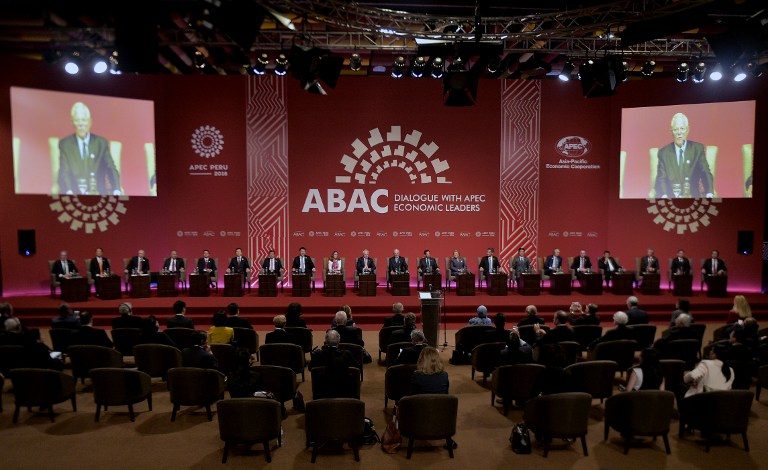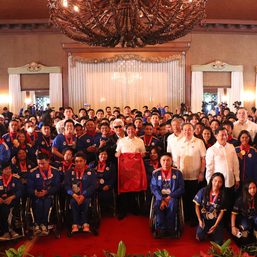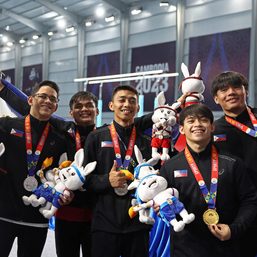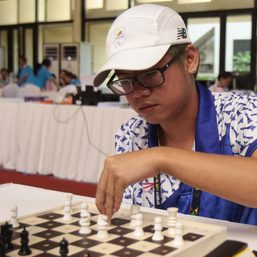SUMMARY
This is AI generated summarization, which may have errors. For context, always refer to the full article.

LIMA, Peru (UPDATED) – Chinese President Xi Jinping touted his country as a leader on free trade at a summit of Asia-Pacific leaders Saturday, November 17, stepping up to fill a void left by US President-elect Donald Trump’s protectionism.
Trump’s shock election victory has created a “hinge moment” in US-China ties, Xi warned as he held his final meeting with President Barack Obama on the sidelines of a summit in Lima, Peru.
“I hope the two sides will work together to focus on cooperation, manage our differences and make sure there is a smooth transition in the relationship and that it will continue to grow going forward,” Xi said.
Obama, who is on his final foreign tour as president, described the relationship as “the most consequential in the world.”
During a vitriol-filled campaign, Trump frequently took a combative stance against China, blaming Beijing for “inventing” climate change and rigging the rules of trade.
The brash billionaire’s attacks on free trade deals and vows to cut back the US role as “policeman of the world” are causing jitters in the Pacific Rim, where the United States and China battle for influence.
Trump has vowed to kill Obama’s signature trade initiative in the region, the Trans-Pacific Partnership, or TPP – an arduously negotiated 12-country deal that pointedly excludes China.
Trump campaigned against the proposal as a “terrible deal” that would “rape” the United States by sending American jobs to countries with cheaper labor.
In a Pacific region hungry for trade, that has left even longtime US allies looking to China to fill the void.
Beijing is pushing two alternative plans, one that is region-wide and one that excludes the United States.
Xi urged regional leaders to advance both plans at the annual Asia-Pacific Economic Cooperation (APEC) summit.
That positions China, a country the United States once considered a threat to free-market capitalism, as the unlikely leader of the movement for open trade.
“Openness is vital for the prosperity of the Asia-Pacific,” Xi said in a keynote address.
In the face of Trump’s protectionist rhetoric, he vowed China “will not shut its door to the outside world, but open it even wider.”
Trump the pragmatist?
US officials have urged the world to give Trump time to get his feet under the desk.
“How you campaign isn’t always the same as how you govern,” Obama told a town hall meeting of young Latin Americans in Lima.
Many leaders seem to be hoping as much within APEC – a 21-member free trade club that accounts for nearly 40% of the world’s population and nearly 60% of the global economy.
New Zealand’s Prime Minister John Key said he was banking on Trump taking a pragmatic turn away from the extremes of his campaign.
“I personally think that President Trump will be like chairman of the corporation Trump,” he said.
Mexican President Enrique Pena Nieto – whose country has been the target of some of Trump’s harshest vitriol – said he would seek “dialogue” with the president-elect to safeguard the neighbors’ crucial trade relationship.
Trump insulted Mexican immigrants as criminals and rapists during the campaign, vowed to force Mexico to pay billions of dollars to build a wall along the border, and threatened to restrict remittances that immigrants in the United States send home.
Turning to China
It is unclear whether there is any future for the arduously negotiated TPP.
The White House said Obama had “urged his fellow leaders to continue to work together to advance TPP.”
But many experts say Trump’s attacks on the deal and his Republican allies’ control of Congress mean it is dead in the water.
Some leaders said TPP could still be saved in some form, although other allies are turning their attention to China’s rival plans.
Japanese leader Shinzo Abe, who took domestic political risks to back TPP, visited Trump in New York on Thursday to hear from the president-elect himself.
The demise of TPP strengthens China’s hand, said Gareth Leather, an economist at consultancy Capital Economics.
“The retreat on the part of America has created an opportunity for China… to expand its influence in Asia,” he said in a note. – Rappler.com
Add a comment
How does this make you feel?





There are no comments yet. Add your comment to start the conversation.